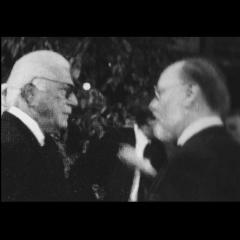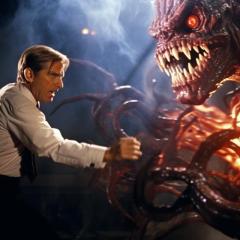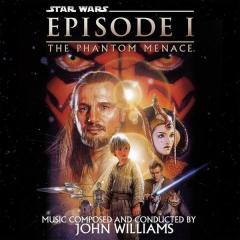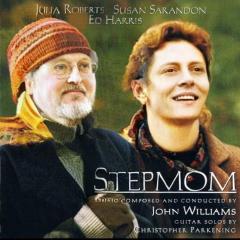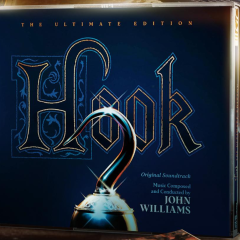-
Posts
2,963 -
Joined
-
Last visited
-
Days Won
14
Reputation Activity
-
 Uni reacted to publicist in Is Hans Zimmer the most revolutionary film composer of all time?
Uni reacted to publicist in Is Hans Zimmer the most revolutionary film composer of all time?
A slight unease for me is to call all this MUSIC in capitals, now we talk about music production and act as if one of those typical 130-minute RCP scores is essentially the same as a huge Rózsa score just assembled a wee bit differently. May we at least say that whatever Zimmer and cohorts produce, it is not always and doesn't act always MUSIC per se, but in a lot of cases, sound design - as per the wish of the actual producers.
That's where my tummyache regarding 'revolutionary' comes in: if i take the genre of film music really as a MUSICAL genre, i don't know if that indeed was in any way revolutionized by modern aesthetics. A lot of it barely can be called music and isn't called up to be such (Horner complained in Vienna how composers now aren't even considered artists but technical personnel like ADR recordists and such).
-
 Uni got a reaction from crocodile in What Is The Last Film You Watched? (Older Films)
Uni got a reaction from crocodile in What Is The Last Film You Watched? (Older Films)
Tonight I experienced a cinematic event 34 years in the making (for me, at least). I've grown up with this movie, seen it a hundred times if I've seen it once, memorized every shot, know everything there is to know about its genesis and production . . . yet I'd never seen it in a theater in my life. Never.
Until tonight:
(Sorry it's blurred. Barely got the camera up in time to catch the only music reference during the end credits.)
Based on that visual, most of you should already know the movie. For those who don't. . . .
Alien
The local Cinema Drafthouse is playing great science fiction classics through the month of October. Last week it was 2001; next week it'll be Star Trek IV. But I wasn't about to miss this opportunity.
In true Drafthouse form, they preceded the movie with a bunch of apropos material: there were some behind-the-scenes clips from the DVD, several previews of extraterrestrial monster movies from the late-70s/early 80s (which served beautifully to emphasize what an astonishing accomplishment Alien was in its time), and an interesting montage of H.R. Giger's work set to weird synth music. Probably the best bit, however, followed the latter piece, and started like any other documentary short. A voice-over interviewer introduced Giger, and asked him about his work on the film. The voice that answered sounded just like Giger, same accent, inflection, everything, but he started babbling nonsense. A couple of the exchanges went like this:
Interviewer: How did you come to work on the movie?
"Giger": Rid Lee Scotch visited me in a fever dream.
Interviewer: Does your wife advise you on your work at all?
"Giger": Her mouth is sewn shut.
Interviewer: Is your mother still alive?
"Giger": Not tonight.
Interviewer: What are your primary influences?
"Giger": Opiates. And black licorice. Would you like to swing in my black licorice hammock?
And so on. It was hilarious, especially if you've watched real interviews with Giger. (I've been trying to find a copy of this thing on YouTube, with no luck. I've gotta find a way to get a copy.)
As for the movie itself . . . what can I say that hasn't been said before? If nothing else, the experience reinforced the fact that there's just nothing like seeing a movie in the theater. Like I said, I know everything about this film, and yet certain subtleties emerged that I'd never really noticed before, mostly in the area of lighting and cinematography. The sets and production design continue to be the greatest element in the picture: I found myself staring past the actors at what was behind them most of the time. I caught a few continuity errors, too, and that was fun. Aside from a couple of hairstyles and some of the random vernaculars, it's aged very well--better, in fact, than most movies from that era.
I've never been able to effectively imagine what a true audience dynamic for this classic would be like. It highlighted a lot of the humorous moments, and the tension in places was palpable throughout the theater. (Before it started, a guy came out to introduce it. He asked for a show of hands from anyone who'd never seen the movie before; surprisingly, there were at least a dozen first-timers in the crowd.)
Overall, it was just a phenomenal movie experience, probably one of the chiefest of my life. And it came at a strangely appropriate time, too. I've spent the last few weeks researching and writing about the history of Goldsmith's score for the film. I started work on it before I even knew that this would be hitting the big screen tonight. Despite the fact that it isn't 100% finished, though, it just seems fitting that I post it now. It's the newest page over at Scorepedia: Alien. Enjoy.
The movie, of course, remains forever **** out of ****, and retains a solid spot on my own all-time top 10.
- Uni
-
 Uni got a reaction from Marcus Stöhr in SCOREPEDIA: Guidelines, Suggestions, and Q&A
Uni got a reaction from Marcus Stöhr in SCOREPEDIA: Guidelines, Suggestions, and Q&A
Okay . . . I'm still working on the thematic analysis, and there's some reference stuff that needs to be added, but I figure it's about time for the next article to hit the site--especially since I got to see the movie itself in the theater for the first time ever tonight: Alien.
This one represented a big step forward for me, and hopefully for the site, too. First off, it's even longer than the one I did for Poltergeist, though some of that arises from the fact that Alien had a much more dramatic and interesting backstory to it. But this time it's not just about one page. I took a much more "organic" approach to it, thinking not just about the article itself but about its extensions and references.
It started as a simple desire to streamline the writing. I found myself inserting parenthetical descriptions of the exotic instruments Goldsmith used for the recording; then I realized how much easier, and better for the site, it would be if I just gave each instrument its own page, since it seems appropriate to have that kind of information there as well. So I copied over a few pages from Wikipedia, trimmed them down to a sleeker length, inserted a "Use in film music" heading . . . and suddenly there were a bunch of new pages, and much more efficient central article. (I did the same with a film scoring term or two.)
Then I started mulling over better formatting for the cue listing. I went back to the drawing board and learned table-making from scratch. From there I learned the craft of template-making, and started to experiment not just with the content but the visual appearance as well. Along the way I created new infoboxes for both composers and scores, a nice version of a quote box, and a few other odds and ends. Again, it's all trial-and-error, and wide open to comment and criticism, but I figured it's about time the place started establishing a look and feel that gives it some credibility. Hopefully that'll draw attention to it and inspire others to contribute.
So let me know what you think, and if you have any other ideas or questions.
- Uni
-
 Uni got a reaction from chuck in What is the best film score of 1999?
Uni got a reaction from chuck in What is the best film score of 1999?
What is it with this recent Goldsmith kick I've been on? Even with two JW scores on that list, my first instinct (and therefore my vote) was for The Mummy. Definitely a return to larger-scale stuff, and just a fantastic filling-out of an entertaining action yarn.
- Uni
-
 Uni got a reaction from karelm in Disney will split with Jerry Bruckheimer
Uni got a reaction from karelm in Disney will split with Jerry Bruckheimer
Bruckheimer's had the impression he's unstoppable ever since the 80s (Michael Bay before there was a Michael Bay). The problem was that Disney fed his ego at least one film too long—actually, one could argue, several more than that.
- Uni
-
 Uni got a reaction from Once in SCOREPEDIA: Guidelines, Suggestions, and Q&A
Uni got a reaction from Once in SCOREPEDIA: Guidelines, Suggestions, and Q&A
That's what I was thinking. Include everything, then delete what isn't needed (or just fill in the empty space with an "Information unavailable" placeholder or something similar).
Absolutely—I would rather we use organizational elements like tables and charts. I missed seeing that we had this template available. I was going to add a bit of info to the cue list itself (the date each piece was recorded, for example), but that should be as easy as adding another "extra_column" preset in the right place.
I'll need a little time to reorganize the info onto this template, but I'll get it done. (Thanks for the reminder!)
UPDATE: Done and done. A bit of a pain, but knowing this template exists going forward I'll have an easier setup ready to go and it'll be much smoother sailing.
- Uni
-
 Uni got a reaction from Once in SCOREPEDIA: Guidelines, Suggestions, and Q&A
Uni got a reaction from Once in SCOREPEDIA: Guidelines, Suggestions, and Q&A
Exactly. I actually spent yesterday creating my case-in-point: Poltergeist.
It's not quite finished yet, but I've been working it up as a sort of "ultimate example" of what a complete score page can potentially be. For obvious reasons, I used a score for which a wealth of information is available (not all pages will be able to reach this level of detail). I'd really like to see us get some better formatting—tables for the soundtrack releases, cue lists, and that sort of thing, and I'd really like to see the template for the Infoboxes at the top of the page get up and running.
But with the tools we have available so far, this is the kind of thing I think we're aiming for . . . and it's another answer to your original question, Ludwig. Let's say you're a new collector interested in learning more about Goldsmith's score for Poltergeist. If you look the title up on WP, you can find one brief page summarizing all three films at once, and absolutely zero on the score itself. WP is frankly a dry well for this kind of specific information. And I don't know why we should slave ourselves creating pages for them over there when we can expend the same effort building something for a ground up that caters directly to film score lovers like us—and something we can put our own names on and take pride in helping create.
You'll notice that I left a space open on the Poltergeist page for your proposed take, Ludwig ("Style of the score"). I'm wondering whether you'd be willing to fill in that blank with the sort of thing you have in mind, so we have a better idea of what you're suggesting. With that in place, and perhaps a couple of other bells and whistles (such as a complete cue analysis), we might eventually be able to direct new contributors here as an example of how to build a new page for a score.
- Uni
-
 Uni got a reaction from Once in SCOREPEDIA: Guidelines, Suggestions, and Q&A
Uni got a reaction from Once in SCOREPEDIA: Guidelines, Suggestions, and Q&A
Okay . . . time to break the silence on this. Like everyone else, the last six months have made it brutally difficult for me to commit extra time to this project. As the creator and "sponsor" of this thread, I carry an extra helping of the guilties over it--but what's done is done.
I'm going to make a real effort to get back to this, and in a better fashion than I did before. Part of the problem was that I burned myself out a bit in attempting to clean up every article that people imported from Wikipedia (by extracting the useless templates and links that were broken in the transfer process). That was ultimately some pretty tedious and unrewarding work. It got me away from what I really enjoy doing, which is writing the articles themselves . . . and when things got busy for me, the thought of spending my free time doing more of that kind of detailed nitpicking just didn't appeal to me enough to come back to it.
But I've thought about it occasionally, and regretted that we didn't get things off to a better start. And there's still nothing preventing that.
A couple of (belated) responses to comments left before:
This was an excellent and necessary point. Ludwig, you were the one who wanted to add a "Style of the Score" section to the articles, a detail that would be too esoteric for Wikipedia's tastes. If you go on too long or indulge in fine-print excesses about a subject they feel only deserves a few paragraphs, the editor types get restless and start slashing prose. Scorepedia is exactly the place where that sort of information can flourish--which is precisely why there should be such a place existing independently of WP.
I think people are interested in seeing this work, and I'm thinking it won't necessarily require the amount of time and will you're talking about, Marcus. Here's the thing: the vast majority of members on this board will think nothing of spending five minutes writing about how Rambo or Total Recall were composed on the Jerry Goldsmith thread, or the importance of Cocoon amongst the early elements of James Horner's repertoire, or whatever. If each of those people were to spend that same five minutes writing the same information over on Scorepedia instead of here, in a few weeks' time things would really start to take off. What we're really asking people to do is take the stuff they're BSing about here and put it to good use there, just a little at a time.
Will they do it? That remains to be seen. Chances are better, though, if a few of us take the lead and set the example.
This was a fantastic way to put it. We don't need to see the place explode overnight to consider it a success. It'll be much more successful in the long run if we take the time and caution to build a strong, solid foundation that'll give folks the right idea about how to approach this thing. The alternative is to rush something into place that's a mile wide and an inch deep, that outsiders will see more as just another fan site than a serious attempt to chronicle an important artistic form in its own right.
So I'm back in again. I'm going to commit to spending a few minutes every day adding something to the site--whether it's a new page or a short paragraph or a bit of editing--or even cleaning up an imported article once in a while, which still needs to be done (though not for hours on end). If a few others will join me in this, we'll see some growth before too long. I remain eminently optimistic.
- Uni
-
 Uni got a reaction from Ricard in James Horner turns the big 6-0
Uni got a reaction from Ricard in James Horner turns the big 6-0
Yeah (probably even before Titanic, IMO). There's definitely a sense of "before-and-after" built into his career. Horner's 80s and early 90s repertoire is quite simply indispensable if you want to get a full picture of his range and abilities. Scores like the two Star Trek installments, Krull, The Rocketeer, Willow, and Glory are must-have classics. Apollo 13, Braveheart, and the like showed some evolution to his style but were still in keeping with his core talents. By the late 90s he'd started shifting into a sort of autopilot/shorthand version of his former self, and he never really got back to the flourishing imagination of his early works.
That's not to say I don't enjoy any of his recent material; just that things changed for him, that's all.
- Uni
-
 Uni got a reaction from indy4 in Lost Return of the Jedi footage shown for the first time in 30 years
Uni got a reaction from indy4 in Lost Return of the Jedi footage shown for the first time in 30 years
This was how the scenes with Jabba were filmed--one of the operators spoke the lines in English, and the voice and Huttese were later dubbed in. (That's why you'll notice, both for Jabba and other aliens that have to be translated in the original trilogy, that the alternate language always "coincidentally" uses the same number of syllables in each sentence as its English equivalent.)
- Uni
-
 Uni got a reaction from Delorean90 in What Is The Last Film You Watched? (Older Films)
Uni got a reaction from Delorean90 in What Is The Last Film You Watched? (Older Films)
I was going to cite some of those moments from the DK series too (my favorites are the banter between Bale and Caine, actually). But those are largely moments provided by the script and talented actors. I don't know that I'd ever put the script for a rom-com into Nolan's hands. But . . . is that necessarily a bad thing?
- Uni
-
 Uni got a reaction from Not Mr. Big in .
Uni got a reaction from Not Mr. Big in .
I get so tired of this BS. I really do. This forum used to be something. We used to have discussions of substance, of real merit, and though people didn't always agree with one another back then, at least we dithered on topics of meaning and weight. People understood back then.
And now what do we get? Threads like this, which only go to demonstrate how little people even know what the hell they're talking about. When I entered my vote, it was with the full expectation that John Williams would have a clear lead. What do I see instead? More people voting for John Williams. It's like it doesn't even matter what we say any more. Anyone who knows John Williams knows his music is better than John Williams, but we still see people who claim to be John Williams fans voting in the majority for John Williams (and who the hell cares any more what John Williams thinks or does, anyway?).
I'm through with this place. I just can't see hanging around a John Williams forum anymore where people vote for John Williams.
- Uni
-
 Uni got a reaction from KK in .
Uni got a reaction from KK in .
I get so tired of this BS. I really do. This forum used to be something. We used to have discussions of substance, of real merit, and though people didn't always agree with one another back then, at least we dithered on topics of meaning and weight. People understood back then.
And now what do we get? Threads like this, which only go to demonstrate how little people even know what the hell they're talking about. When I entered my vote, it was with the full expectation that John Williams would have a clear lead. What do I see instead? More people voting for John Williams. It's like it doesn't even matter what we say any more. Anyone who knows John Williams knows his music is better than John Williams, but we still see people who claim to be John Williams fans voting in the majority for John Williams (and who the hell cares any more what John Williams thinks or does, anyway?).
I'm through with this place. I just can't see hanging around a John Williams forum anymore where people vote for John Williams.
- Uni
-
 Uni got a reaction from Quintus in .
Uni got a reaction from Quintus in .
I get so tired of this BS. I really do. This forum used to be something. We used to have discussions of substance, of real merit, and though people didn't always agree with one another back then, at least we dithered on topics of meaning and weight. People understood back then.
And now what do we get? Threads like this, which only go to demonstrate how little people even know what the hell they're talking about. When I entered my vote, it was with the full expectation that John Williams would have a clear lead. What do I see instead? More people voting for John Williams. It's like it doesn't even matter what we say any more. Anyone who knows John Williams knows his music is better than John Williams, but we still see people who claim to be John Williams fans voting in the majority for John Williams (and who the hell cares any more what John Williams thinks or does, anyway?).
I'm through with this place. I just can't see hanging around a John Williams forum anymore where people vote for John Williams.
- Uni
-
 Uni got a reaction from alicebrallice in What Is The Last Film You Watched? (Older Films)
Uni got a reaction from alicebrallice in What Is The Last Film You Watched? (Older Films)
I posted it here, too, but you'd have to dig back about twenty pages now, so here it is.
So was I. It wasn't anything like the classic Superman, but it's everything like every other big movie from the last 10-20 years.
- Uni
-
 Uni got a reaction from publicist in John Williams Plagiarizing Himself
Uni got a reaction from publicist in John Williams Plagiarizing Himself
Gawd . . . I swear, if I hear one more person complain about the endlessly-documented TRON/Dennis The Menace three-note crossover, I'm gonna lose it. . . .
- Uni
-
 Uni got a reaction from Quintus in Very sad news
Uni got a reaction from Quintus in Very sad news
Folks . . . let's get some perspective here. Economic times are horrendously bad right now. Much of it (particularly in the region this deals with) is the consequences of poor decision-making coming home to roost. It's a sad and unfortunate development, to be sure . . . but there are other consequences to be mindful of. People are going hungry because they can't find work. There isn't much hope on the horizon for them. Losing a symphony is a tragic thing, but so is thousands of people losing their livelihood. Many of the people who're still fortunate enough to remain employed couldn't afford to go see the symphony if it were still around anyway.
Life is hard, and it's about prioritizing. I hate to see something like this happen, but do I rank it a deeper loss than so much else happening right now? I can't say that I do. A lot has to change here. Things need to get back on track in a big way in a lot of other areas before they can worry about getting musicians and actors back on stage again. (Here's hoping they do.)
But for the sake of all that's holy, we are not standing on the verge of the death of democracy or (for heaven's sake) planetary collapse because one country can't support an arts budget like they used to. Let's keep our eye on the ball here, people.
- Uni
-
 Uni got a reaction from Ren in Man Of Steel (2013 Superman reboot directed by Zack Snyder)
Uni got a reaction from Ren in Man Of Steel (2013 Superman reboot directed by Zack Snyder)
Don't usually do this, but I think this belongs here as much as it does on the other thread, so here's my take:
Man of Steel
What a disappointment. Seriously.
I feel like I've just been made to endure a prolonged beating. This movie is little more than noise, spectacle, and weak attempts at philosophizing over morality and cultural influences. The actors all make a game try of it, I suppose, but ultimately their performances had the feel of a high school play--an attempt to play-act at roles others have filled much more effectively in far better movies. The effects . . . are CGI effects. A lot of it comes across as convincing and impressive (though a fair amount of it, surprisingly, doesn't), but it looks like every other sci-fi action movie on the market nowadays.
That's ultimately this film's biggest problem: there is nothing here--literally not a single thing--we haven't seen a hundred or more times before, usually much better-executed than this. In a sense, the only thing this movie did for me is make me realize how exhausted I am of watching movies like this.
I am so tired of seeing the rummy-tum-tum military types watch doom unfold on tactical screens while looking as though their serious expressions alone will be able to overcome whatever threats they see there. This was cliched back in the 70s, was really starting to get old in the 80s, and is now officially way, way past its expiration date.
I am so tired of knowing exactly what's going to happen to each character, in each scene, because filmmakers can't come up with anything more interesting than what others have done before them. When a movie telegraphs who's going to live and die almost from the first moment you see each person, it leaves very little fodder for suspense. Along the same lines . . . prolonged battle scenes between invulnerable opponents just isn't interesting. We know they're going to destroy everything around them, and we know just as well they won't get hurt doing it. What's the point anymore?
I am so tired of computerized effects being used as a surrogate for good storytelling, as though we can be hypnotized by visual cacophonies thoroughly enough to forget that nothing's actually happening up there. Can I make a point here? Doing something the same, only bigger, or faster, or louder, does not make it different. It only makes it bigger, faster, and louder, thereby increasing the odds that it will also be more annoying.
I am so tired of movies that combine those last two elements ad nauseum. The first scene of this type I can remember was in The Matrix Reloaded, when Neo starts fighting the army of Agent Smiths. There's too many of them for him to overcome, and we know damn well he's not going to die. So we spend ten interminable minutes bored out of our minds by what are supposed to be eye-popping effects, but they have no substance because it's all happening in a computer--literally AND figuratively--and wondering why in the hell he doesn't just fly away, which he finally does long after we're good and pissed. Man of Steel unfortunately keeps this tradition alive through several such scenes.
I am so tired of Hans Zimmer's music. This exact same type of score worked moderately well in the Dark Knight movies. Hearing it again here, the same rhythms, the same ambiance, just made me shake my head in frustration. I'm done with the guy.
And I am so, so, SO, SO tired of angst, regret, and bitter self-reflection being played as some sort of mark of nobility and higher thinking. At some point--around the time of the aforementioned Matrix sequels, I think--"deep" supposedly became "cool." The rule (such as it is) seems to be the more seriously you take yourself, the more seriously the audience will take you. These days, screenwriters who haven't learned the meaning of good drama and solid characterization from classic literature and cinema can create what they believe is a convincing replica of it through the heavy-handed use of melancholic restlessness. The result, in this case, was a first for me: before today I'd never left a theater after watching a Superman movie in such a dreary state of depression.
This may reflect the influence of Christopher Nolan. I'm a fan of his movies, but where this kind of serious-handed contemplation works very well in stories like Inception and the Dark Knight trilogy, it's completely wrong for Superman. Angst was Bruce Wayne's burden, his mode of perception, a central part of his character. Taking Clark Kent down that road is a wasted attempt at deeper meaning the franchise just doesn't need.
One of the hallmarks of the 1978 Superman film (which, I'll freely admit, remains one of my all-time favorites) was it's clever and stylish sense of humor. They knew we knew who Superman was, what his habits were, and they used it to magnificent effect. Man of Steel is singularly lacking of humor and almost entirely devoid of joy--save the scene when Superman first tries out his powers, which may have been the best moments in the movie. There's no sense of triumph, even in his victories. Nothing in this story ever rises above the level of bittersweet . . . and what the hell fun is that?
The level of destruction in this movie is appalling, to the point where it drains even the trademark heroism from the comic world's most classic hero. I mean, I understand he's trying to save the whole world 'n' all, and it's small wonder there are some casualties along the way, but the death toll in Metropolis alone by the end of the film cannot be any less than five figures. The horror of that kind of mass annihilation just feels misplaced in a Superman movie. I remember when the franchise couldn't stand the idea of a busload of people getting hurt. Now we've got a Superman standing at a Hiroshima-scale ground zero worriting over the kinda guy he oughta be.
The overall style of the film falls short as well. It fumbles around on a disordered timeline for so long I eventually lost track of whether I was in the past or in the present. A movie that feels it necessary to prologue (at length), backflash repeatedly, display an illustrated history, reveal plot through hallucinatory vision, and still feels the need to feed us great gobs of expository dialogue straight through is trying way too hard. And yet, with all that revelation going on, both the story and the characters occupying it feel flat, empty, and underdeveloped.
So is it really that bad? I gotta say . . . yeah, it is. Aside from a handful of moments that kinda worked, it was far more disappointment and depression than it was worth.
*1/2 out of ****
- Uni
-
 Uni got a reaction from airmanjerm in Man Of Steel (2013 Superman reboot directed by Zack Snyder)
Uni got a reaction from airmanjerm in Man Of Steel (2013 Superman reboot directed by Zack Snyder)
Don't usually do this, but I think this belongs here as much as it does on the other thread, so here's my take:
Man of Steel
What a disappointment. Seriously.
I feel like I've just been made to endure a prolonged beating. This movie is little more than noise, spectacle, and weak attempts at philosophizing over morality and cultural influences. The actors all make a game try of it, I suppose, but ultimately their performances had the feel of a high school play--an attempt to play-act at roles others have filled much more effectively in far better movies. The effects . . . are CGI effects. A lot of it comes across as convincing and impressive (though a fair amount of it, surprisingly, doesn't), but it looks like every other sci-fi action movie on the market nowadays.
That's ultimately this film's biggest problem: there is nothing here--literally not a single thing--we haven't seen a hundred or more times before, usually much better-executed than this. In a sense, the only thing this movie did for me is make me realize how exhausted I am of watching movies like this.
I am so tired of seeing the rummy-tum-tum military types watch doom unfold on tactical screens while looking as though their serious expressions alone will be able to overcome whatever threats they see there. This was cliched back in the 70s, was really starting to get old in the 80s, and is now officially way, way past its expiration date.
I am so tired of knowing exactly what's going to happen to each character, in each scene, because filmmakers can't come up with anything more interesting than what others have done before them. When a movie telegraphs who's going to live and die almost from the first moment you see each person, it leaves very little fodder for suspense. Along the same lines . . . prolonged battle scenes between invulnerable opponents just isn't interesting. We know they're going to destroy everything around them, and we know just as well they won't get hurt doing it. What's the point anymore?
I am so tired of computerized effects being used as a surrogate for good storytelling, as though we can be hypnotized by visual cacophonies thoroughly enough to forget that nothing's actually happening up there. Can I make a point here? Doing something the same, only bigger, or faster, or louder, does not make it different. It only makes it bigger, faster, and louder, thereby increasing the odds that it will also be more annoying.
I am so tired of movies that combine those last two elements ad nauseum. The first scene of this type I can remember was in The Matrix Reloaded, when Neo starts fighting the army of Agent Smiths. There's too many of them for him to overcome, and we know damn well he's not going to die. So we spend ten interminable minutes bored out of our minds by what are supposed to be eye-popping effects, but they have no substance because it's all happening in a computer--literally AND figuratively--and wondering why in the hell he doesn't just fly away, which he finally does long after we're good and pissed. Man of Steel unfortunately keeps this tradition alive through several such scenes.
I am so tired of Hans Zimmer's music. This exact same type of score worked moderately well in the Dark Knight movies. Hearing it again here, the same rhythms, the same ambiance, just made me shake my head in frustration. I'm done with the guy.
And I am so, so, SO, SO tired of angst, regret, and bitter self-reflection being played as some sort of mark of nobility and higher thinking. At some point--around the time of the aforementioned Matrix sequels, I think--"deep" supposedly became "cool." The rule (such as it is) seems to be the more seriously you take yourself, the more seriously the audience will take you. These days, screenwriters who haven't learned the meaning of good drama and solid characterization from classic literature and cinema can create what they believe is a convincing replica of it through the heavy-handed use of melancholic restlessness. The result, in this case, was a first for me: before today I'd never left a theater after watching a Superman movie in such a dreary state of depression.
This may reflect the influence of Christopher Nolan. I'm a fan of his movies, but where this kind of serious-handed contemplation works very well in stories like Inception and the Dark Knight trilogy, it's completely wrong for Superman. Angst was Bruce Wayne's burden, his mode of perception, a central part of his character. Taking Clark Kent down that road is a wasted attempt at deeper meaning the franchise just doesn't need.
One of the hallmarks of the 1978 Superman film (which, I'll freely admit, remains one of my all-time favorites) was it's clever and stylish sense of humor. They knew we knew who Superman was, what his habits were, and they used it to magnificent effect. Man of Steel is singularly lacking of humor and almost entirely devoid of joy--save the scene when Superman first tries out his powers, which may have been the best moments in the movie. There's no sense of triumph, even in his victories. Nothing in this story ever rises above the level of bittersweet . . . and what the hell fun is that?
The level of destruction in this movie is appalling, to the point where it drains even the trademark heroism from the comic world's most classic hero. I mean, I understand he's trying to save the whole world 'n' all, and it's small wonder there are some casualties along the way, but the death toll in Metropolis alone by the end of the film cannot be any less than five figures. The horror of that kind of mass annihilation just feels misplaced in a Superman movie. I remember when the franchise couldn't stand the idea of a busload of people getting hurt. Now we've got a Superman standing at a Hiroshima-scale ground zero worriting over the kinda guy he oughta be.
The overall style of the film falls short as well. It fumbles around on a disordered timeline for so long I eventually lost track of whether I was in the past or in the present. A movie that feels it necessary to prologue (at length), backflash repeatedly, display an illustrated history, reveal plot through hallucinatory vision, and still feels the need to feed us great gobs of expository dialogue straight through is trying way too hard. And yet, with all that revelation going on, both the story and the characters occupying it feel flat, empty, and underdeveloped.
So is it really that bad? I gotta say . . . yeah, it is. Aside from a handful of moments that kinda worked, it was far more disappointment and depression than it was worth.
*1/2 out of ****
- Uni
-
 Uni got a reaction from Pieter Boelen in Star Trek Into Darkness SPOILERS ALLOWED Discussion Thread
Uni got a reaction from Pieter Boelen in Star Trek Into Darkness SPOILERS ALLOWED Discussion Thread
You guessed it right—it was the Takei. Nice touch, that.
No. To get from earth to a starship in such a manner that you get to see a bitchin' establishing shot of the Enterprise along with a building riff of the main theme, you have to take a shuttle. This would be why the transporters weren't functioning in TMP and why Sulu flew Admiral Kirk to the Enterprise in TWOK, even though the transporters were presumably working just fine at the time.
- Uni
-
 Uni got a reaction from Wojo in Star Trek Into Darkness SPOILERS ALLOWED Discussion Thread
Uni got a reaction from Wojo in Star Trek Into Darkness SPOILERS ALLOWED Discussion Thread
You guessed it right—it was the Takei. Nice touch, that.
No. To get from earth to a starship in such a manner that you get to see a bitchin' establishing shot of the Enterprise along with a building riff of the main theme, you have to take a shuttle. This would be why the transporters weren't functioning in TMP and why Sulu flew Admiral Kirk to the Enterprise in TWOK, even though the transporters were presumably working just fine at the time.
- Uni
-
 Uni got a reaction from Delorean90 in Star Trek Into Darkness SPOILERS ALLOWED Discussion Thread
Uni got a reaction from Delorean90 in Star Trek Into Darkness SPOILERS ALLOWED Discussion Thread
Now, see? THAT'S a mature, intelligent response.
Obviously there's no such thing as an "official" declaration of what I'm talking about. And of course these subjects are open to general discussion. (I'm not looking to put a gag order on anything, fercryinoutloud.) It's a choice each person can make to be aware of the things they say, understanding that—with a touch of caution—they won't be the one who ruins an ending for someone else. That's why folks use the spoiler boxes and warning banners. It's why this entire thread has been separated from the others. You and Blume may not be bothered at all when you learn about the surprise early . . . but some people are. It's the same as anything else: you show respect and courtesy to others and extend them a friendly hand when you give consideration to their perspective when expressing yourself.
You can choose to be the better person by avoiding giving things away . . . talking around them . . . using the spoiler box . . . or even by utilizing a clever hidden message (one that had me laughing out loud!!!) to keep the wizard behind the curtain for those who want to preserve the magic in Oz.
- Uni
-
 Uni got a reaction from Jay in Star Trek Into Darkness SPOILERS ALLOWED Discussion Thread
Uni got a reaction from Jay in Star Trek Into Darkness SPOILERS ALLOWED Discussion Thread
Personally speaking, I didn't find any gaping plot holes in STID—or at least they didn't bother me enough to notice. The movie was sufficiently entertaining for me to suspend my disbelief above those gaps. I may also be allowing the "alternate reality" premise to gloss over most of these issues (perhaps more than I should). On the other hand, I've been compulsively trained as a Nitpicker to the point where I can't overlook some of the missed connections and wonky premises that cropped up along the way.
Here's a couple of my biggest ones . . . which, interestingly enough, provide a contrast in perspective. Some folks have expressed disappointment that the entire story took place in (what appeared to be, anyway) only a day or two. I don't see why that's a problem myself; some movies portray the events of only a few hours, and 24 certainly got plenty of mileage out of the action possible in a single day. My issue isn't with time elapsed—it's with what elapsed during that time.
To set the stage: no one in either movie ever attaches a value to the word "warp." They never specify which warp, whether it's Warp one, three, five, whatever. Since we've returned to the earliest incarnation of the Trek universe, maybe we can just assume that "warp" is a standard, fixed, super-light speed that's probably nowhere as fast as later, upgraded vessels can move (as demonstrated by the Dreadnought-class ship in this very movie). So for the sake of this nitpick, let's just say that "warp" in Abrams' world is somewhere around Warp 2—significantly faster than light, but not exponentially so.
With that in mind:
- Forget what I said in my calculations above. The Enterprise must be capable of something closer to Warp 9.9998, since it takes only minutes for them to go from Earth to Klingon space. Even in the NextGen timeframe that's usually a trip of a few days. While the jaunt to Kronos may have taken longer (we could assume some passage of time between scene cuts), on the way home there's no question about it: the Enterprise goes to warp, Marcus catches up inside of 30 seconds later, fires on them, and brings them out of warp less than a minute later . . . right on Earth's doorstep. How is this possible?
- While we're on that, who the hell's drivin' this thing, anyway? Neither Sulu nor the navigator beside him seem to have much of an idea when to stop their starship. They relied entirely on unfortunate circumstances to come out of warp on both occasions. The first time the warp core malfunctioned, halting them at the edge of Klingon space (which is where they were supposed to be, right?). Given that it only takes a minute or two to reach Klingon space, if they had stopped even a few seconds later they'd have been halfway to the Neutral Zone. Shouldn't they have stopped there anyway? It's the same way the second time. Marcus blasts them to an early stop--right next to the moon. Just think: if he hadn't, they would've started their five-year mission a year ahead of schedule.
- And while we're on that . . . Klingon space isn't very big, is it? The Enterprise floats to an unpleasant stop within sight of Kronos. That sightline puts it well inside the solar system—well within the next planet's orbit, in fact. Yet they're still supposedly on the edge of Klingon space. Not much of an "empire" yet, I suppose.
I'm on a roll. Can't resist one more:
- As the Enterprise is falling helplessly from space, Sulu announces that if they don't get shields operating soon they'll be incinerated on re-entry. Very true. So Kirk Riverdances on the warp core for a minute, eventually aligning the two thingies and restoring power. Sulu fires thrusters just as the ship disappears into the cloud layer. It emerges (in very cool fashion, I might add) a moment later, and the news comes that both power and shields have been restored. Except . . . those clouds would lie well below the ozone layer. The Enterprise would've been cinders by then.
- Uni
-
 Uni got a reaction from Pieter Boelen in Star Trek Into Darkness SPOILERS ALLOWED Discussion Thread
Uni got a reaction from Pieter Boelen in Star Trek Into Darkness SPOILERS ALLOWED Discussion Thread
Personally speaking, I didn't find any gaping plot holes in STID—or at least they didn't bother me enough to notice. The movie was sufficiently entertaining for me to suspend my disbelief above those gaps. I may also be allowing the "alternate reality" premise to gloss over most of these issues (perhaps more than I should). On the other hand, I've been compulsively trained as a Nitpicker to the point where I can't overlook some of the missed connections and wonky premises that cropped up along the way.
Here's a couple of my biggest ones . . . which, interestingly enough, provide a contrast in perspective. Some folks have expressed disappointment that the entire story took place in (what appeared to be, anyway) only a day or two. I don't see why that's a problem myself; some movies portray the events of only a few hours, and 24 certainly got plenty of mileage out of the action possible in a single day. My issue isn't with time elapsed—it's with what elapsed during that time.
To set the stage: no one in either movie ever attaches a value to the word "warp." They never specify which warp, whether it's Warp one, three, five, whatever. Since we've returned to the earliest incarnation of the Trek universe, maybe we can just assume that "warp" is a standard, fixed, super-light speed that's probably nowhere as fast as later, upgraded vessels can move (as demonstrated by the Dreadnought-class ship in this very movie). So for the sake of this nitpick, let's just say that "warp" in Abrams' world is somewhere around Warp 2—significantly faster than light, but not exponentially so.
With that in mind:
- Forget what I said in my calculations above. The Enterprise must be capable of something closer to Warp 9.9998, since it takes only minutes for them to go from Earth to Klingon space. Even in the NextGen timeframe that's usually a trip of a few days. While the jaunt to Kronos may have taken longer (we could assume some passage of time between scene cuts), on the way home there's no question about it: the Enterprise goes to warp, Marcus catches up inside of 30 seconds later, fires on them, and brings them out of warp less than a minute later . . . right on Earth's doorstep. How is this possible?
- While we're on that, who the hell's drivin' this thing, anyway? Neither Sulu nor the navigator beside him seem to have much of an idea when to stop their starship. They relied entirely on unfortunate circumstances to come out of warp on both occasions. The first time the warp core malfunctioned, halting them at the edge of Klingon space (which is where they were supposed to be, right?). Given that it only takes a minute or two to reach Klingon space, if they had stopped even a few seconds later they'd have been halfway to the Neutral Zone. Shouldn't they have stopped there anyway? It's the same way the second time. Marcus blasts them to an early stop--right next to the moon. Just think: if he hadn't, they would've started their five-year mission a year ahead of schedule.
- And while we're on that . . . Klingon space isn't very big, is it? The Enterprise floats to an unpleasant stop within sight of Kronos. That sightline puts it well inside the solar system—well within the next planet's orbit, in fact. Yet they're still supposedly on the edge of Klingon space. Not much of an "empire" yet, I suppose.
I'm on a roll. Can't resist one more:
- As the Enterprise is falling helplessly from space, Sulu announces that if they don't get shields operating soon they'll be incinerated on re-entry. Very true. So Kirk Riverdances on the warp core for a minute, eventually aligning the two thingies and restoring power. Sulu fires thrusters just as the ship disappears into the cloud layer. It emerges (in very cool fashion, I might add) a moment later, and the news comes that both power and shields have been restored. Except . . . those clouds would lie well below the ozone layer. The Enterprise would've been cinders by then.
- Uni
-
 Uni got a reaction from Marian Schedenig in What Is The Last Film You Watched? (Older Films)
Uni got a reaction from Marian Schedenig in What Is The Last Film You Watched? (Older Films)
Star Trek: Into Darkness.
Wow. Just . . . wow.
What a great fun, engaging, intense movie experience. I had my concerns that this would just be a sequel--meaning, just another iteration of the first film (it didn't help much that the opening sequence had me thinking that's exactly where it was headed). It would've been all right, I suppose, but . . . I was hoping for a movement to the next level. Something that showed the series (such as it is) is going somewhere.
And that's just what I got. This was a summer action blockbuster, to be sure, and a rousing good one at that, but I was deeply impressed with the growth of the characters and their relationships. And the references to, and connections with, the original series and films were solidly realized and achieved. A great time all around.
Now I get to head over to the spoilers thread and have some fun. . . !
- Uni





